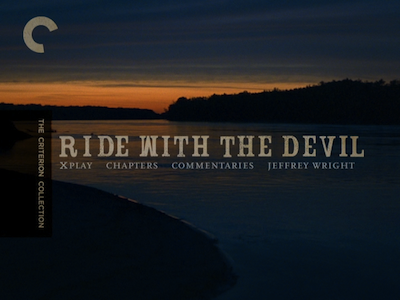
Ang Lee has had an interesting career since coming to Hollywood from Taiwan. In his first three English-language pictures, he defined his artistry through his eclecticism. Beginning with a Jane Austen adaptation (1995's Sense & Sensibility
Much is made of the fact that the typical Ang Lee hero is somehow repressed. Indeed, though maybe his least successful movie, his 2003 adaptation of the Hulk
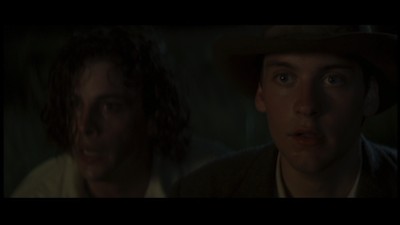
In Ride with the Devil, Tobey Maguire plays Jake Roedel, an American-born German living in Missouri. Though his father urges him to head North and join other Germans, who are mainly pro-Union, the teenager would rather stay with his family. Fate has other ideas: Northern raiders, nicknamed "Jayhawkers," attack the home of his best friend, Jack Bull Chiles (Skeet Ulrich). When Jack's father is killed, the boys escape into the night and join the "Bushwhackers," an irregular army separate from the organized Confederate forces. They are a citizen militia, if you will, identified by their soldiers' long hair. These guerilla fighters raid enemy camps and punish jayhawkers trespassing in their state.
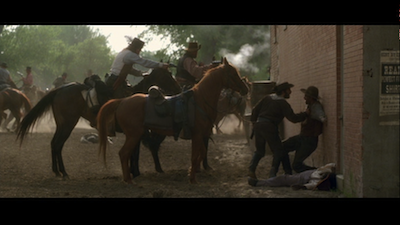
Ang Lee and his regular screenwriter James Schamus, working from the novel Woe to Live On
This is pretty well in line with the uneasy relationship America has in regards to this period in its history. At one level, the Confederates are as fundamentally American as the rebellious army that stood up against England at the nation's birth. From a certain perspective, Abraham Lincoln might as well have been as far away as King George was, and this "War of Northern Aggression" was not about the right to own slaves so much as it was one half of the country demanding the other half not tell them what to do. This argument tends to obscure the trees in a forest of rhetoric, and one that time hasn't succeeded in chopping down. Just last month Virginia's Governor Bob McDonnell tried to establish a Confederate History Month, and he insisted that this was a celebration of the vast history of the American South. In doing so, he tried to sweep the issues of the fight and the cessation under the carpet, obfuscating his own (and many other people's) racism in the wrapping of 21st-century advancement. For many of us, it's hard to understand why so many people want to celebrate a war they lost, as if being on the wrong side of history is something to be proud of.
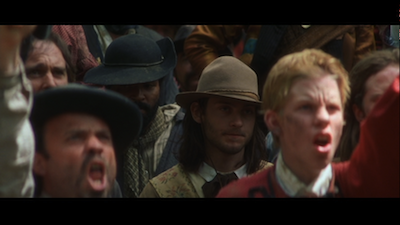
Yet, of this mythology many a romantic hero has been born. Movies have their own history of promoting the legend of proud Confederates. How many women who should know better have dreamed of being swept off their feet by a man in a gray uniform because they watched Gone with the Wind
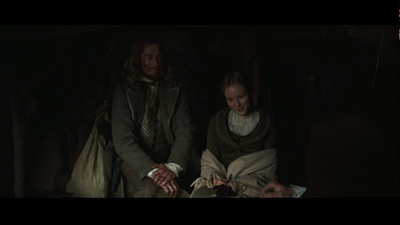
In Jake Roedel, Tobey Maguire gives us a more identifiable and possibly more honest figure: a boy who entered the cause with true conviction, but who leaves it as a man disheartened by what he has seen. As the only member of the troops under George Clyde and Black John Ambrose (James Caviezel) who can read and write, he is questionable for more than his Germanic origins. Though a tough fighter, he is also the sensitive one. In the first scene of action, when Ambrose's raiders kill Union soldiers and the shopkeeper who is giving them service, Jake tries to convince the others not to burn down the shop. They've already made the owner's wife a widow, must they make her a pauper, as well?
Such kindness is not to be rewarded, and later good deeds and moral logic only serve to come back on Jake, especially as the war takes a dark turn. Following some successful campaigns, the Bushwhackers decamp for the winter. This lull in combat only serves to cool the fervor of some, and to make the situation more desperate. Jake emerges from the white snow to enter a period of particular blackness. The mood has shifted from righteous anger to one of mayhem and death. This is a transformation that is quite common in war movies (such as Coppola's Apocalypse Now
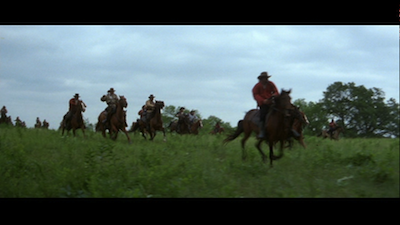
Except Jake has found someone he can trust, and in this we get the classic Ang Lee pairing, the kind of friendship we see in the cowboys in Brokeback Mountain [review] or the aging swordfighters in Crouching Tiger, Hidden Dragon
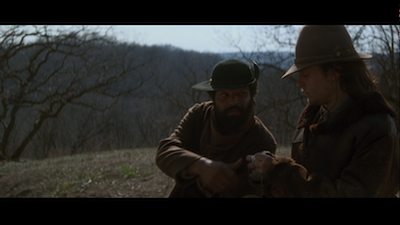
Chaos reigns when Ambrose's troops join forces with those of William Quantrill (John Ales), who then leads the combined army on a massacre in Lawrence, Kansas, razing the town and killing most of the men. A real-life figure and a real-life tragedy, both the man and the story have been subject to Hollywood propaganda before, both to the good and the bad. The attack on Lawrence is Ride with the Devil's particular heart of darkness. The bloodshed wakes Jake up to the atrocities he has become a part of, and he can no longer pretend that anyone is fighting for any deep belief. Now they are fighting just to fight, killing just to kill.
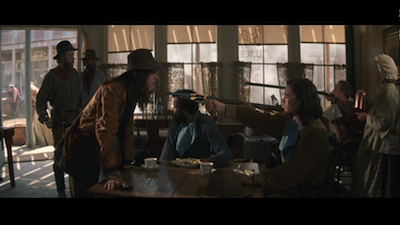
I never caught Ride with the Devil in its earlier cut, so I can't exactly say how much better it works in Lee's original, newly restored draft. The new version, which is closer to what Lee intended, only clocks in at ten minutes longer than the theatrical version, though from what I've read the changes extend far beyond restoring footage. Material has been rearranged and scenes have been revisited to give Ride with the Devil more emotional punch. Much of the restored material goes to character motivation, to the growing unease that affects Jake and, to a lesser degree, Jack Bull, who is also doubtful about much of what the Bushwhackers are doing but who would rather keep his mouth shut and not ask too many questions. He goes along to get along.
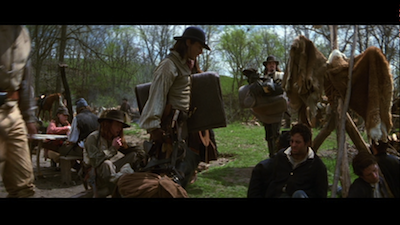
A major addition revolves around Mark Ruffalo's character, a neighbor of Jake and Jack's who ends up fighting for the Union. He is introduced far earlier, and it makes it more powerful when he turns one of Jake's good deeds against him. The additional expansion of the aftermath of that betrayal further displays for Jake how there is not much sense in war. Ruffalo is still only in the movie for less than five minutes, and he is just one of many faces in a rather impressive cast of talent that would go on to bigger things in both film and television. In addition to Maquire, Caviezel, and Baker, the movie also has an early performance from Jonathan Rhys Meyers as an amoral Bushwhacker and Tom Wilkinson in a bit part as a farmer who provides shelter for Jake and Holt. The acting is uniformly good throughout the movie, and Lee manages to use Tobey Maguire's "All American Boy" presence in a way only Steven Soderbergh has managed to since (in the film The Good German [review]). Maguire is convincing as a man of action in the battle scenes, with Lee hiding his boyish good looks behind his long hair. Near the end of the film, when the hair is cut off, his fresh face reminds us that this was just a boy of 19 who has been put through hell.
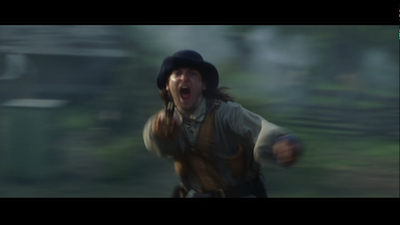
It's Jeffrey Wright's picture all the way, however. The talented actor is given a meaty, nuanced role, one that avoids servile clichés or straying into "Magical Negro" territory. In early scenes, Holt provides the conscience for the movie, silently watching, his presence reminding us of both the horrible things that lay just outside of frame in terms of society and also just how complicated the war really was. Here is a man who has, for all intents and purposes, been freed, and yet he chooses to fight alongside his enslavers. His transformation is one as subtle and as powerful as Lee's demystification of the war itself. As Holt becomes friends with Jake, the two meet in the middle. Again, it comes down to communication. Not only does Holt understand what Jake is trying to say, but Jake lets him speak his mind, as well. This is an important step in the actualization of both of their characters.
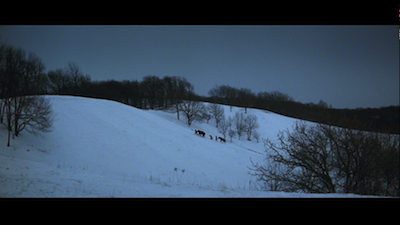
Another big star of Ride with the Devil (and of this beautiful new DVD transfer) is Frederick Elms' gorgeous photography. A regular collaborator of Lee, Jim Jarmusch, and David Lynch, Elms is equally adept at capturing the cramped, dirty spaces where the men hide as he is the open terrain that becomes the field of battle. The hillsides, the snowy mountains--these are all lovely to look at within the widescreen frame. Elms then turns them ugly by hurling blood and murder at the images like Jackson Pollack hurling paint on a blank canvas. The cameraman and his director, alongside editor Tim Squyres, show the fighting as chaotic, fast, and disconcerting, juxtaposing it against the film's otherwise laconic pacing. Though this makes the horrible warfare all the more explosive, the slowness of the rest of the movie is Ride with the Devil's one big flaw. It sometimes drags too much, particularly after Kansas, when Jake's final transformation involves a lot of sitting around on Tom Wilkinson's farm, convalescing and staring at Jewel's breasts. It's not a particularly dynamic final act.
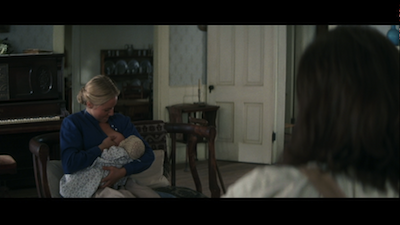
But then, the finale of the movie is also about healing, about the slow getting back to a sense of normalcy. Wounds take time to mend, whether they are physical, spiritual, or mental. Thankfully, like so much else in the movie, Lee and Schamus don't make this explicit. Jewel's newborn is as much of a symbol of a better tomorrow as Jake's haircut, yet no one ever says, "This child is the reason we are fighting/must stop fighting." Perhaps more obvious is the plan to head to California and sunnier climates. There is a better life over there, away from this, courtesy of Manifest Destiny. More sticky history.
Given the current political turmoil, time has not necessarily healed the wounds of this nation, but we're getting there. As part of the American collective unconscious, the Western story has been slowly reassessed in terms of its portrayal in popular culture. Ang Lee's Ride with the Devil in that sense is to the Civil War what Clint Eastwood's Unforgiven
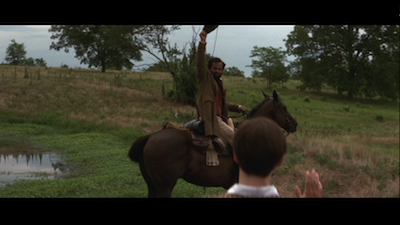
Watch the trailer for Ride With the Devil

1 comment:
This movie when first released was somewhat an oddity. How can Taiwanese oriental get the emotions involved in the Great American conflict of the Civil War. If anything, Ang Lee has educated me. Watching this film made me think of Vietnam, Korea, and even Hong Kong. Indeed Southeast Asia mirrors exactly what was occurring in 1860s America! Imagine a North and South United States with different governing styles and conflicts of conscience. The present-day ideological split of the coastal states and the heartland seem to portend that we are indeed living in different camps of the same country. Perhaps it took the understanding of an Eastern perspective to illustrate what was sacrificed and achieved by our bloodiest chapter in the saga that is America.
I gravitate to this film as it grows on me with repeated viewings. Lee has coaxed perhaps the greatest performances these young actors will ever deliver. The dialogue and regional accents flow from these Gen-Xers as if by nature. As if they were raised in the border/slave state of Missouri. I have never read the source material, but the language and delivery show a cockiness and humour, without the assurance of truth or tradition. Youth, perhaps, is always in this position. Pretending to know what is appropriate for the moment, but not for history. Their constant braggadocio masks their insecurity for their future and that of the country as well. I have heard some reviewers dismiss Rhys Meyer's and Wilkinson's roles as bit parts, They are far from that and used to great effect to illustrate the different temperaments and arguments of people on the "same" side for very different reasons. I was shocked to learn that this was considered a bomb to this day. This film should grow in stature to surpass similar films in this genre. Rank with Shane, Cold Mountain and Heaven's Gate as a truly great "Western"!
Post a Comment